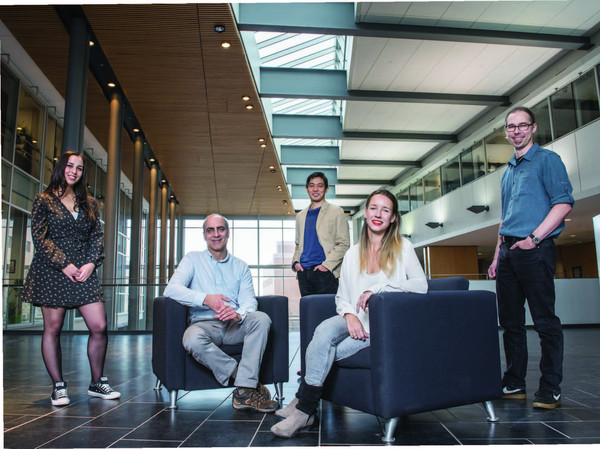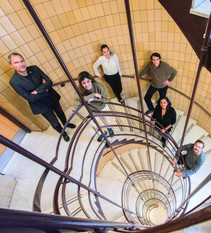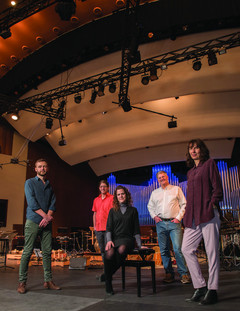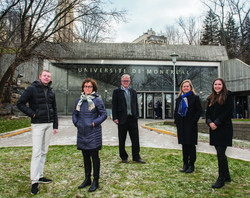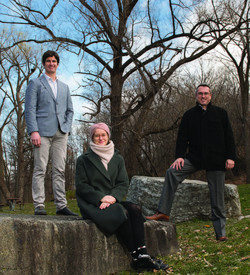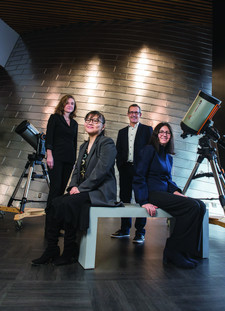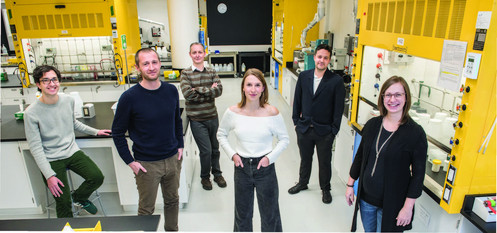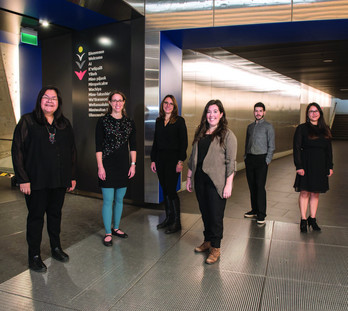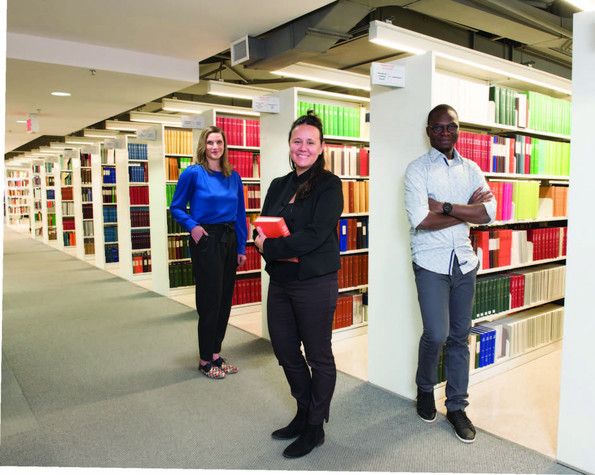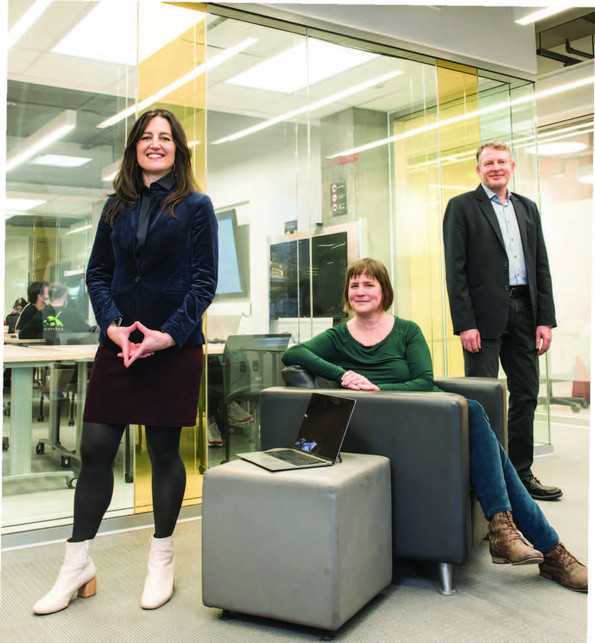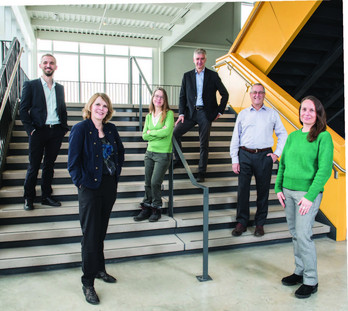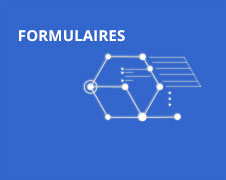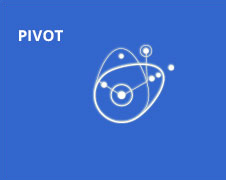Ten sectors of excellence
The UdeM sectors of excellence simultaneously encompass a research domain with a critical mass of talent, an exceptional and impactful research, and a creative and innovative methodology that holds strong potential for knowledge enrichment. These sectors represent strong foundations on which we can build the development of initiatives capable of responding in original, rigorous, and relevant ways to major societal challenges - today and tomorrow.
Bio-innovation and Digital Health
The UdeM encompasses all the health disciplines, human and animal alike. It combines a wide and integrated range of expertise which covers the fundamental approaches on structural, genomic, metabolomic, and proteomic biology, as well as their implementation in precision health throughout life. The UdeM is recognized for its expertise in the discovery and production of innovative medicines and bioformulations. Its research teams possess cutting-edge expertise in immunotherapy and cellular therapy, pharmacogenomic, and nanomedicine, and ensure their implementation, particularly in oncology, cardiovascular diseases, and mother and child health.
The development of digital and artificial intelligence (AI) at the UdeM constitutes a fertile ground for fruitful collaboration which stirs our research teams in fields as varied as the discovery and supply of innovative medicines assisted by artificial intelligence, the automation of diagnostic approaches and imaging, the digital transformation of health care and health services. Its Digital Health Consortium brings together all the actors of the 5 health and AI networks. Thanks to its Consortium, the UdeM stands starkly out in areas related to the characterization and use of dynamic algorithms in health data, whether they are of molecular, genetic, clinical or populational origin. It also rests on the expertise of its teams in the field of governance, innovation in health and public policies, as well as on the close links established with the citizens and patients-partners to promote a research geared to the transformation and increase of digital technology in health for the common good.
Brain, Mind, Perception
The UdeM is internationally recognized for the quality of its research on cognition, psychology, neuropsychology, and neurosciences, notably in fields such as motor control, vision, pain, and cognition. Its researchers are committed to developing further essential aspects of cognition, particularly those related to sensorial perception, sleep, memory, and communication, in normal and pathological contexts such as trauma, cardiovascular arrest, or neurodegenerative diseases. These approaches are combined with other expertise in motor rehabilitation, both communicational and cognitive, treatments of addictions, mental health, play or art therapy, and musical therapy. They will ultimately enable the development of highly innovative and integrated therapeutic approaches. The UdeM supports the deployment of these fundamental and applied research activities in neurosciences and mental health, throughout life. It strives at increasing our global understanding of the human and animal brain, our mind, our perceptions, our emotions and behaviour, and the necessity of establishing and maintaining social networks.
Creation, Culture and Imaginaries
Our societies are built on imaginaries, cultures, narratives, values, and strong collective legacies, which are highly diversified. The UdeM has developed an internationally recognized expertise in these major fields of studies including interculturality, intermediality, digital humanities, the study of religions and sociocultural perspectives of the sacred, musicology and ethnomusicology, the study of memory and intangible or built heritage, literatures, civilisations and cultures, notably those of the First Nations. This adept sociocultural knowledge, combined with dialogue with communities, bolsters the development of new and highly creative approaches; it similarly improves our relations to others and the world. Research-creation also occupies a preeminent place at the UdeM, especially in areas such as music, cinema, videogames, landscape architecture, design, communication, and literature. Research-creation teams clearly stand out for their work on narratives and their close involvement with communities, inspired by an overall vision of individual or collective empowerment.
Environment, Biodiversity and Society
For over a hundred years the UdeM has been actively engaged in biodiversity research, particularly in vegetal or microbial biodiversity, as well as in the fields of animal and environmental health. Our teams work on the issues of preservation, conservation and adaptation, as well on the challenges of water management, ecotoxicology, agroindustry, green chemistry, energy storage and conversion, and territory planning. Besides this considerable expertise in natural sciences and environmental studies, the UdeM also studies the impact of our social activities on the planet, our relation to the landscape, to the territories, and the vulnerabilities. The works resulting from these studies thus provide venues and potential answers in domains related to environments of sustainable livelihood (planning, logistics, mobility, and services), circular economy (eco-conception, responsible production and consumption), governance, management of natural resources, and corporate social responsibility. These various research initiatives have the common goal of implementing technologies and essential knowledge and expertise to confront climate changes, extreme events, the crisis of biodiversity, and the exhaustion of natural resources. They provide indispensable knowledge and tools that will enable the future generations to respond to their needs in an ecological and sustainable way.
Fundamental Explorations of Reality
Understanding our constantly evolving world would be impossible without basic sciences which allow us to expand our conceptions of existence, universe, and matter. The UdeM is actively engaged in these long-term fundamental research activities, ranging from studies at the atomic, molecular and cellular levels, all the way through quantum sciences, astrophysics, the study of dark matter, and exoplanets, while encompassing mathematics, philosophy and epistemology. Their ongoing development generates major methodological advances, theoretical and applied, that will greatly benefit future generations.
Digital, Human and Artificial Intelligence
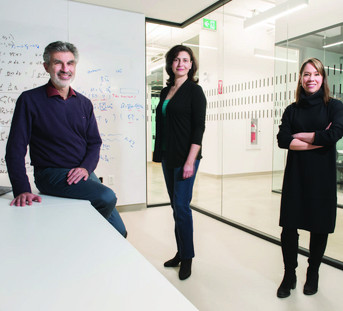 |
The UdeM is internationally recognized for its strengths in artificial intelligence (machine learning, deep
learning, natural language processing, computational linguistics, neuro-computing), digital intelligence
(mathematical optimization, operational research, bio-informatics), statistics (bio-statistics, social
statistics) and sciences of digital information. These recognized areas of expertise combine with
established strengths in the areas of imaging, language, movement, and visualization of data. With a
globally recognized expertise in fields such as cyber-justice, cyber-criminality and cyber-security, privacy,
and socially responsible development of artificial intelligence, the UdeM seeks to promote the
development of responsible artificial intelligence, in line with the principles of The Montreal Declaration
for a Responsible Development of Artificial Intelligence, launched by the UdeM.
Innovative Materials and Processes
Materials science is at the heart of countless technological advances and can create new opportunities in many areas, including manufacturing, industry and medicine. The UdeM stands out for its ability to link experts in artificial intelligence with leaders in designing and producing new materials. The UdeM has developed a unique expertise in areas such as molecular assembly, low-dimensional materials, physical chemistry of polymers, catalytic conversion, non-equilibrium processes, surface and interface engineering, biological fabrics and membranes, bio-based materials, and quantum materials. The UdeM also targets innovative uses of new materials in a wide range of applications, while examining social acceptability and impact of these new materials and processes on health and environment. These goals reflect an overarching perspective of eco-responsibility and include, among other things, initiatives to develop sustainable materials and processes for energy transition and mobility of tomorrow.
Social Relations, Democracy, and Responsability
The study of collective systems, social relations and challenges of governance, and democracy is a highly dynamic sector at the UdeM. It provides a complementary expertise which spans the provincial and federal as well as the international levels. The issues range widely and address the nature and definition of our democracies themselves. These include: the analysis and comprehension of models of governance, globalization, international relations, and legal and political systems; the examination of social relations, living together with its attendant implications (equity, diversity, and inclusion; social inequalities and vulnerabilities; family and community links; demographic changes; working environment; planning and transformation of space; process of social innovation; new economic models). All these challenging issues require close analyses and probing to better grasp them.
Thanks to their proven expertise in ethics, and in compliance with the UdeM’s promotion of the common good, numerous UdeM’s teams integrate ethics through their reflection on responsibility and social justice, legislation and public policies, individual and collective rights, governance and regulation, and equity and fundamental rights
Acquisition and Transmission of Knowledge
The UdeM developed a rich and multisectoral expertise on both knowledge acquisition and on our relationship to knowledge, with the aim of leading learners of all ages toward success and well-being. This expertise is manifest in fields ranging from theories on education and language study and communication (oral, musical, visual or digital) through to research activities in didactics, the foundations of education, psycho-pedagogy, and neurosciences and learning. The teams exploring these challenging areas develop inventive methodologies that expand our knowledge and enrich programmes at all levels. They also foster pedagogical innovation, the reduction of inequalities, and the improvement of the educational systems, particularly thanks to close collaboration with stakeholders. Some of the principles guiding research projects include experiential knowledge or learning systems, to ultimately empower the stakeholders to appropriate the results for a direct positive impact on society.
One Health
The recent COVID-19 pandemic has made it clear that there is no divide between environmental health, animal health, and human health: there is only One health, and that is health of ecosystems on a global scale. The "One Health" approach, in which the UdeM has been a leader for several years, emphasizes the importance of interactions between humans, animals and their environments. Bringing together a unique combination of expertise in human, animal, environmental health and at the level of population, territorial and global perspective, the UdeM promotes the One Health approach by allowing greater complementarity between fields.
This vision is based on proven strengths of the UdeM and its network in the fields of immunology, microbiota, infectiology, epidemiology, toxicology, chronic diseases (for example, cardiovascular and metabolic diseases), oral health, prevention, healthcare, nutrition, animal and agricultural production, health humanities, environmental sciences (protection and conservation), land use planning and management, as well as all the determinants of health, well-being and living conditions of humans and animals. The UdeM analyzes the interaction between all living beings, on an individual and collective basis, while placing them in their political, economic, social, cultural and territorial context. This vision allows to address, in a systemic way, issues such as globalization, social justice, sustainable urbanization, antibiotic resistance, antimicrobial therapies, zoonoses, food safety, quality and eco-responsibility of healthcare and services, and response of living beings to contaminants and extreme events

